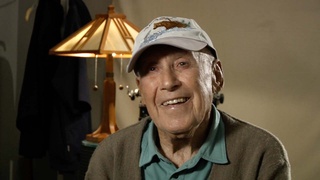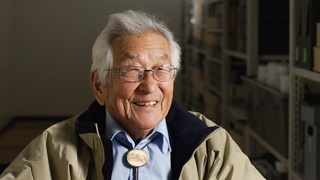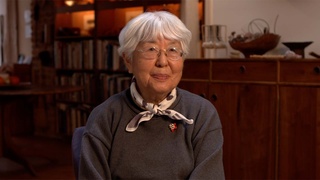Interviews
Strictly American, but sympathize with Japan
It’s like a father and mother fighting, you know like - I know my folks, they weren’t anti-America, they loved the United States, they loved Japan too, they loved both country and to be fighting, it was the worst thing that could possibly happen even to me. I said, gosh in a way, when Japan was being successful, going down, I said hey, good. They’re successful, they’re show…you know, a powerful nation, you know.
But, it’s one of those ambivalent feeling here, gee…[laughs] You love both countries, but you have to choose between one side. Well, naturally I’m an American, so you know, I’m strictly American but I sympathized with Japan’s position, there even. I think there was, what was that, reverend at the last minute, he was trying to prevent this war…I forgot, there were a lot of Americans, were trying to prevent the war, they understood Japan’s position, you know.
And if I had a white face, I probably would have been called to Washington to become a semi-expert on Japan and, but being with this face, automatically you become pro-Japanese you know.
Date: March 25, 2005
Location: California, US
Interviewer: Sojin Kim
Contributed by: Watase Media Arts Center, Japanese American National Museum
Explore More Videos

Marriage and Returning to US
(1916 - 2013) Member of the U.S. Military Intelligence Service

Feeling prejudice while looking for jobs
(1919 - 2015) Nisei who served in World War II with the 442nd Regimental Combat Team

Generosity of the Italians
(1919 - 2015) Nisei who served in World War II with the 442nd Regimental Combat Team

Invited to teach at Harvard by his boss
(1919 - 2015) Nisei who served in World War II with the 442nd Regimental Combat Team

The riot in Manzanar
(b. 1921) Nisei veteran who served in the occupation of Japan

The Dopey bank that survived the war
(b. 1934) Award-winning Disney animation artist who was incarcerated at Topaz during WWII

Evacuated to the Jungle
(b. 1938) Philipines-born hikiagesha who later migrated to the United States.

Captured by Guerillas after bombing of Pearl Harbor
(b. 1938) Philipines-born hikiagesha who later migrated to the United States.

Grandfather picked up by US Army
(b. 1952) Former banking executive, born in Hawaii

Father's business partner operated their farming business during WWII
(b. 1935) Sansei businessman.

Father was convinced the constitution would protect him
(b. 1935) Sansei businessman.

The lack of discussion about family’s incarceration in Amache
Sansei judge for the Superior Court of Los Angeles County in California


Her brother’s reasons as a No-No Boy
(b. 1923) Japanese American poet, activist

Her grandfather was pressured to teach Japanese
Sansei judge on the Superior Court of Los Angeles County in California
